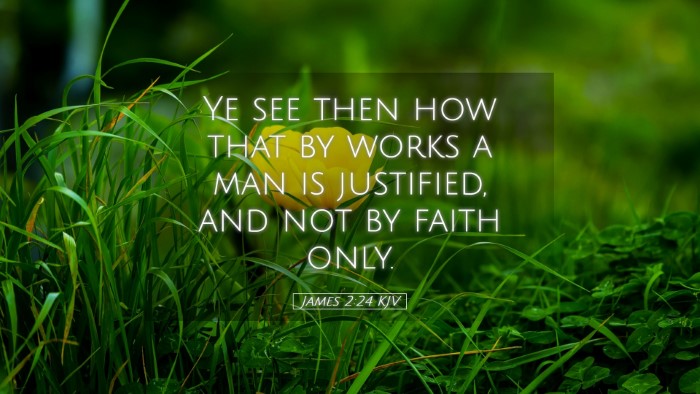Old Testament
Genesis Exodus Leviticus Numbers Deuteronomy Joshua Judges Ruth 1 Samuel 2 Samuel 1 Kings 2 Kings 1 Chronicles 2 Chronicles Ezra Nehemiah Esther Job Psalms Proverbs Ecclesiastes Song of Solomon Isaiah Jeremiah Lamentations Ezekiel Daniel Hosea Joel Amos Obadiah Jonah Micah Nahum Habakkuk Zephaniah Haggai Zechariah MalachiJames 2:24
James 2:24 KJV
Ye see then how that by works a man is justified, and not by faith only.
James 2:24 Bible Commentary
Commentary on James 2:24
James 2:24 (KJV): "Ye see then how that by works a man is justified, and not by faith only."
This verse stands as a pivotal point in the epistle of James, a text that has drawn considerable attention and sometimes controversy within Christian theological discourse. Here, we explore the insights gathered from esteemed public domain commentaries that elucidate the depth and implications of this verse for a diverse audience of pastors, scholars, and laypeople.
Contextual Analysis
To understand James 2:24 fully, one must consider its context within the broader message of the epistle, which addresses faith and its practical outworking in the lives of believers. James, often referred to as the "Proverbs of the New Testament," emphasizes practical righteousness and the manifestation of faith through deeds.
Contrast with Paul’s Teachings
Some may perceive a tension between James’ assertion and the teachings of Paul, particularly regarding justification by faith. Albert Barnes articulates this discrepancy, stating that while Paul speaks of justification through faith in Christ (Romans 3:28), James highlights the necessity of works as a demonstration of that faith. It is essential to harmonize these perspectives by recognizing that genuine faith invariably produces good works.
The Nature of Justification
This verse calls attention to the nature of justification. Adam Clarke points out that James is not advocating for a salvation contingent solely upon works, but rather he underscores that true faith is evidenced by actions. Thus, works are a necessary manifestation and affirmation of one’s faith.
Faith That Works
Matthew Henry elaborates further on this concept by asserting that a faith that does not result in good works is not authentic. He stresses that to claim faith without corresponding action is a delusion. The essence of James’ argument is that although faith alone, in a theological sense, justifies, its authenticity is validated through works.
The Role of Works in Faith
James 2:24 serves as a reminder that our works testify to the reality of our faith. Faith is not a mere intellectual assent; it is active obedience. As such, true faith manifests itself through actions reflective of God’s character and commandments.
- Evidence of Faith: Actions serve as tangible evidence of an individual’s faith in Christ.
- Integration of Belief and Action: There is an inseparable link between what one believes and how one acts.
- Challenge to Hypocrisy: James’ clarity here challenges any form of spiritual hypocrisy—believers must align their beliefs with their behaviors.
Illustrative Examples
James provides examples earlier in his letter that exemplify faith manifested through works, notably in the lives of Abraham and Rahab. Barnes comments on Abraham, stating that his willingness to sacrifice Isaac demonstrated faith in action—his works justified him before both men and God. Similarly, Rahab's actions in hiding the spies illustrate that faith is not passive but actively seeks to align with God’s will, thus exemplifying how genuine faith is validated through works.
Theological Implications
The theological implications of James 2:24 are profound. This verse underscores the concept of faith working through love (Galatians 5:6) and highlights the idea that salvation involves a transformative process that affects one's conduct in the world. Clarke emphasizes that while justification is instant and by faith alone, the overflow of that faith must become evident through the believer's life.
Practical Application
For pastors and leaders, James 2:24 serves as a directive to cultivate congregations committed not only to sound doctrine but also to lives that bear fruit in accordance with faith. Theology must incite action, as true faith should provoke believers to engage in good works, thus drawing others to Christ. For theologians, this verse offers fertile ground for discussions on the relationship between faith, grace, and works, calling for a nuanced understanding that embraces both faith's internal reality and its external manifestation.
Students of Scripture are urged to reflect on their own faith and the actions that demonstrate its authenticity. It serves as both a conviction and encouragement to understand that while we are justified by faith, our lives should be testament to that faith through our works.
Conclusion
James 2:24 encapsulates the harmony that exists between faith and works, emphasizing that true faith is evidenced through deeds. The insights gained from public domain commentaries affirm that while justification is by faith, it is the works of the believer that testify to the authenticity of that faith. As we engage with this verse, let us be reminded of our calling to be both hearers and doers of the Word, reflecting the grace we have received in our everyday lives.


